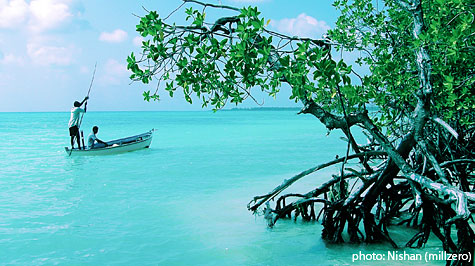CELEBRATING 20 YEARS OF LOVE FOR THE ENVIRONMENT
On September 11, 2009, the first environmental NGO formed in the Maldives, marked its 20th anniversary. Bluepeace was started in 1989 by a very young group whose concern for the protection of the local environment for future generations led to the registration of the organization. The enthusiastic young group was too young to register an NGO according to the regulations of that time and had to convince relatives sympathetic to the cause to act as founder members.
“When we started people thought we were crazy,†said Ali Rilwan, the Executive Director of the organization, recalling the initial days when environmental protection were not buzz words, and when a group trying to save a tree or calling for protection of turtles were either ridiculed or laughed at.
During the past two decades Bluepeace conducted a number of campaigns to protect our environment, to increase public awareness on environmental issues and to save endangered or threatened species. Some of the campaigns have been successful while others were not forceful enough to combat the growing abuse of environment. Despite a campaign by Bluepeace to Save Groupers, concrete steps were not taken by the authorities to stop the overexploitation of the species, which led to a severe depletion of groupers and ultimately the demise of grouper fishery as well.
Bluepeace has been vocally advocating for the protection of marine turtles. While the government’s 1995 ban on catching, sale, import and export of marine turtles was effective to some extent in increasing the turtle population, Bluepeace has always stressed the importance of protecting turtle eggs and nesting beaches. New reports of increased catching and killing of marine turtles mean fresh efforts are needed in the campaign for turtle protection.
Bluepeace has raised concern about increasing damages to environment because of industrial activities and has cautioned against the selection of islands with rich biodiversity and ecological significance for activities such as tourism. We have called for the creation of more nature reserves in the country, and raised alarm when Hanifaru Bay, a whale shark mating area, was threatened with industrial activity. Bluepeace welcomes the government’s decision to protect the Hanifaru Bay area. However, we regret that islands and areas of equally important ecological significance, such as Hudhufushi and Dhiffushimaadhoo area, have not been protected to date.
Bluepeace recognizes the importance of mangrove ecosystems in protecting our environment and regrets that mangroves are threatened by increased human activity. We have stressed the significance of safeguarding coastal vegetation and reefs for protection of our islands.
Some of the issues that have been raised in Bluepeace blog are complex in nature and complicated. We understand how difficult it will be for the authorities to find a quick solution to the environmental hazards created by Thilafushi – a toxic bomb in the ocean. While it will be a formidable task to overcome the problem of sewage contamination of the seawater around Malé, the gravity of the issue can neither be ignored.
Despite being plagued by a number of domestic environmental problems, the Maldives cannot afford to ignore global environmental issues and their wider implications on this low-lying nation. As the world gears up for the UN climate summit to be held in December, the impacts global warming, sea level rise and climate change can have on the Maldives cannot be underestimated. The issues of migration and adaptation, the scenario of becoming sea level refugees one day, and joining forces with the most vulnerable countries to combat climate change will be some of the issues that Bluepeace hopes to debate and discuss in Copenhagen.

Photo: Nalaka Gunawardene РMal̩, November 1989
In November 1989, less than three months after Bluepeace was formed, the first small states conference on sea level rise was held in the Maldives. As a dramatic conclusion to the conference, a demonstration was held in Male’, in which students and the general public spoke on the imminent dangers of living in a low-lying country. A large billboard placed by Bluepeace asked the question “Do you know we are just four feet above sea level?†Twenty years later we need not ask the same question, as the world is well-aware of the dangers Maldives faces. However, we face the urgent need to talk and work with the rest of the world to find solutions.
Bluepeace is an organization driven entirely by volunteers and we take pride in the dedication of our members and their love for the environment. We appreciate the time and energy that artists, graphic designers, photographers, writers, teachers, doctors, divers and people from all walks of life contribute to Bluepeace and our environment.
Follow Bluepeace on Twitter
Join Bluepeace on Facebook
Read Bluepeace Blog
Visit Bluepeace Website
——-
VULNERABLE

As one of the lowest-lying countries in the world, Maldives is particularly vulnerable to climate change. The proliferation of images in today’s internet age is such that Maldives is known the world over as a stunning holiday destination. While Maldives has been the subject of many documentaries and news articles regarding climate change, to date no documentary has been produced by Maldivians for an international audience. This is a chance for Maldives to show vulnerability to the world as seen through our eyes.

To commemorate the 20th anniversary of Bluepeace — Maldives’ first environmental NGO — and to showcase the documentary talent of Maldivian artists, Bluepeace, the Maldives Photographers Association and 350.org are calling upon Maldivian photographers to engage in a photo exhibition, Vulnerable.
For more information please visit http://www.bluepeacemaldives.org/vulnerable
